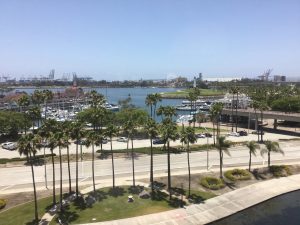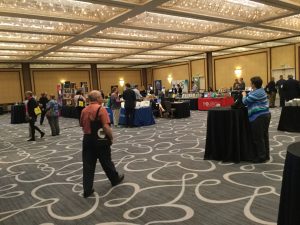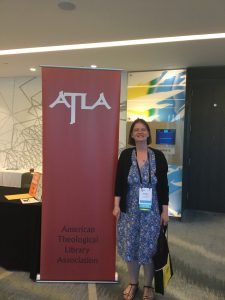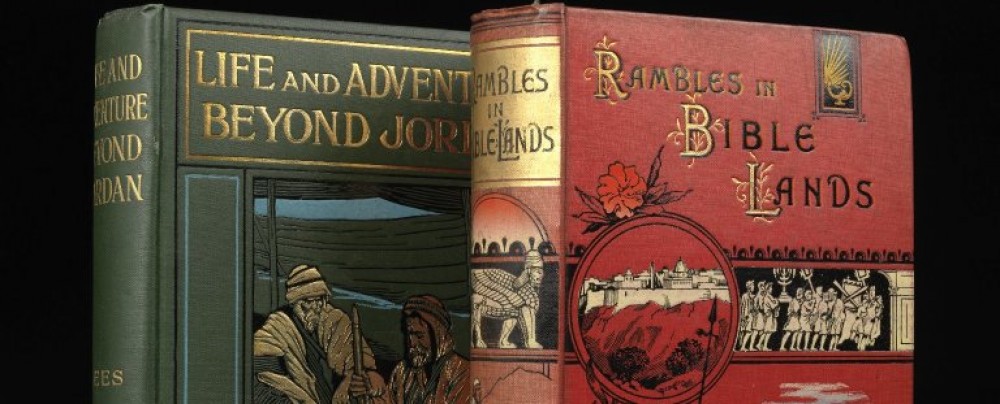I arrived in Long Beach on Tuesday 14 June, after a 22 hour journey, and checked into the conference hotel at Long Beach, California. I was there to attend the American Theological Library Association (ATLA) conference 2016, and I was fortunate enough to have the support of my institution, the University of Edinburgh, and a professional development grant from the Chartered Institute of Library and Information Professionals Scotland.

View from my hotel window
My key objective was to share New College Library Edinburgh’s unique story and talk about our recent work unwrapping its hidden collections through cataloguing projects in my conference paper. I was also keen to experience the wider library, information and knowledge sector context of theological libraries in the US, as many of the postgraduate students I meet come from the USA. Learning about collection management in theology and religious studies was also important, particularly raising my awareness of new digital resources in theology and religious studies. Finally I wanted to hear more about the US approach to library projects, including partnership working and working with decision makers.
The conference opened on Wednesday with a President’s Welcome session for first time attendees and an opening reception which included delicious food – I am now a convert to fish tacos! On Thursday a packed day opened with an ATLA products update breakfast, when I was particularly interested to hear about ATLA’s services for alumni users. The first plenary session by Bobby Smiley (Michigan State University) sketched out the landscape of digital humanities and what this could mean for theological libraries. Key points for me were the importance of students as contributors to projects, digital humanities as a means of showcasing collections (e.g. Michigan University’s Sunday School books) and the use of data visualisation (e.g. tree maps using circulation data and classmarks to visualise what the use of your library collection looks like).
Rebekah Bedard’s paper on Collaborative outreach initiatives at Pitts Theology Library gave some really interesting insights into her work with external partnerships with the Grolier Society to curate an exhibition, and her programme of rare book exhibition library tours led by ‘docents’ – experienced volunteers (often retirees) who delivered sessions written by library staff. While convinced that this kind of collaboration fosters deep engagement with Special Collections, Rebekah also underlined the importance of open communication, building lasting relationships and careful planning of educational tours.
An all conference lunch was set against the background of a discussion on diversity strategy within ATLA – the first instance of diversity as a major conference theme. I learnt about the context of the theological libraries in membership of ATLA, which has traditionally had strong membership roots in Christian institutions, and the challenges and opportunities diversity presented for them. After a session on the ACLS Humanities e-book programme, I was welcomed at a meeting of representatives from institutions working in the Presbyterian & Reformed traditions, including Princeton Theological Seminary and Pittsburgh Theological Seminary.

Exhibitors’ hall
Friday dawned with an early continental breakfast in the Exhibitors Hall, and a lively plenary presentation on diversity from Rahuldeep Gill (California Lutheran University) – author of my favourite conference quote, “ATLA – You’re more than a database to me!”.
Next, Which should we buy? was a really engaging session from Richard M. Adams of Pitts Theology Library which covered, to me, very familiar territory of user difficulties with e-books and the complex landscape of e-book acquisitions. I liked his analogy of e-books being in an ‘incunabula stage’, where reader behaviour was changing at slower pace than technical innovation, and e-books still mimicked print as incunabula mimicked manuscripts. He made a strong case that to choose e-books only, with a blanket e-preference policy, would severely limit pedagogical choices. More at https://goo.gl/1VdlZp
The afternoon saw me step up to present my paper The Library in which they took so much delight : Rediscovering the treasures of New College Library, Edinburgh which was very kindly received. I was also able to distribute all my copies of my exhibition publication Given in Good Faith, which made more room for presents to go back in my suitcase!

Conference paper over!
My final session that day was a case study presentation of projects to create and promote locally created digital collections, led by speakers from Garrett-Evangelical Theological Seminary. This talked through the steps of scoping projects, investigating available resources and applying for and receiving a grant, including the nuts and bolts of working with student workers on scanning projects. Then it was time for dinner with a group of ATLA attendees at the California Pizza Kitchen.
Saturday started early with a fascinating session on using archives to document religious activism and making the connection between archives and social justice. The massacre of 9 people during a prayer service at Mother Emanuel AME Church in South Carolina in June 2015 was used as a reference point to reflect on how creating an archive is a political act of remembering : “Archivists have power in their hands to champion or to erase the past.”

Impact factors for theological journals
Determining the value of theological journals, presented by Garrett Trott (Corban University) looked at the use of citation analysis as a tool for measuring the value of theological journals. He had conducted a study on a selected number of titles as a basis for decision making for switching database subscriptions. He noted that, with the average citation between 20 and 27 years old he found significantly less emphasis on currency than in the ‘hard social sciences’ and also that most research in this area is still published as book form.
It’s always illuminating to meet professionally with theological librarians, who have a dedicated role in this subject area and have consequently built up a depth of knowledge and experience. I was inspired by seeing the kind of local and home grown digital resources that US libraries have created, and the potential they are exploiting for partnerships with churches, volunteers and alumni. And I was fascinated to experience the US institutional landscape for theological libraries, which has a different context for diversity to the UK, and slightly different use of language – faculty, seminary, docent. If I missed anything, it was visiting an actual theological library, at this hotel based conference. I hope to return to the US in future years to do just that.
Christine Love-Rodgers, Academic Support Librarian – Divinity
